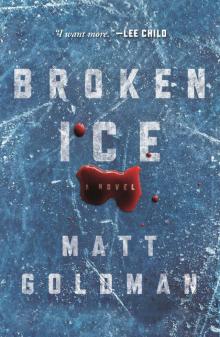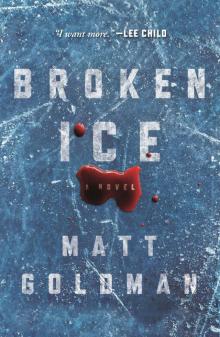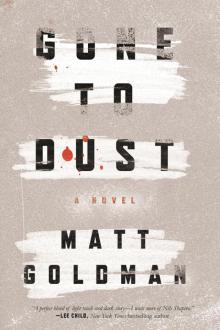- Home
- Matt Goldman
Dead West
Dead West Read online
Begin Reading
Table of Contents
About the Author
Copyright Page
Thank you for buying this
Tom Doherty Associates ebook.
To receive special offers, bonus content,
and info on new releases and other great reads,
sign up for our newsletters.
Or visit us online at
us.macmillan.com/newslettersignup
For email updates on the author, click here.
The author and publisher have provided this e-book to you without Digital Rights Management software (DRM) applied so that you can enjoy reading it on your personal devices. This e-book is for your personal use only. You may not print or post this e-book, or make this e-book publicly available in any way. You may not copy, reproduce, or upload this e-book, other than to read it on one of your personal devices.
Copyright infringement is against the law. If you believe the copy of this e-book you are reading infringes on the author’s copyright, please notify the publisher at: us.macmillanusa.com/piracy.
For my wife, Michele
Who is loving, intelligent,
Beautiful(ly) challenging
Always kind
How lucky I am
She married down.
1
Beverly Mayer sat tall, strong, and upright. Her blue eyes sparkled. A pair of reading glasses hung around her neck from a gold chain. Her gray hair appeared long but was twisted and folded on top of her head like a challah. She wore a soft pink suit of thick wool. It looked European and expensive. She sat next to her husband of sixty-seven years. I know because that’s how she introduced him. “This is Arthur, my husband of sixty-seven years.”
Arthur Mayer did not speak. He rode shotgun in a vehicle called marriage. He slumped shrunken in his suit made of brown herringbone tweed. His neck was too small for his white dress shirt—the shirt didn’t touch his neck the way Saturn’s rings don’t touch Saturn. His lower jaw jutted forward. Heavy black-framed spectacles crept down his nose. A fingerprint marred the left lens. Arthur Mayer’s eyes had shrunk, too, small and green like lima beans. A Band-Aid covered something on his forehead, as if his skin had worn thin in one spot and needed reinforcement. He clutched a black metal cane in his right hand and made no eye contact. But Arthur Mayer had great hair. Thick and silver and combed meticulously. It appeared he hadn’t lost a strand since the Great Depression. I couldn’t take my eyes off it.
“Are you listening to me, Mr. Shapiro?” said Beverly Mayer. She put a smile under her nose and said, “Mr. Shapiro?”
“Yes,” I said. “I’m listening. Go ahead.”
Beverly Mayer said, “Our grandson’s fiancée died last week. Heart failure, they say. Imagine that. A twenty-eight-year-old who hadn’t been sick a day in her life. Poor Ebben is devastated. We’re already concerned about what he’s doing with his trust fund out there in Hollywood. And now this girl, Juliana, goes and dies. It’s bound to lead to imprudent decision making. For heaven’s sake, the principal from which Ebben’s trust fund grew was earned over 150 years ago. We will not sit idly and watch him squander a fortune like his father did.”
“Any foul play suspected in his fiancée’s death?”
We sat in the Mayers’ cavernous living room on St. Paul’s Summit Avenue. The mansion was built by Frederick C. Fallhauser, lumber baron and grandfather of Beverly Mayer. It had 33,000 square feet of mahogany floors, oak-paneled walls, carved wooden ceiling beams, and leaded glass windows. It’s the kind of place that, after the Mayers die, will have a gift shop and velvet ropes steering people to a gift shop that sells tickets for tours and commemorative coffee table books.
Beverly said, “The police didn’t suspect foul play. Apparently, the girl had one of those eating disorders. I suppose they all do out there in Hollywood. Maybe she starved herself to death. But why she died is not really the point. The point is we’d like to know what business dealings Ebben has got himself into. He’s having an open house tonight to celebrate Juliana’s life. I asked if Ebben meant a funeral. He said no, a celebration. I don’t know what that is. Regardless, Arthur and I would like you to be there.”
“In Los Angeles? Tonight?”
“Yes. It’s only 7:00 A.M. there. You have plenty of time to make it.”
I looked at Arthur to see if he agreed but got nothing. He might have been sleeping with his eyes open. I said, “All right, well, I suppose I can get on a plane to Los Angeles and find out how Ebben is spending his money. But you do realize once he received the trust fund, it’s his. He can do whatever he wants with it. You have no recourse against your grandson.”
“We have no legal recourse,” said Beverly Mayer. “That I understand. But Arthur and I are still the heads of this family, and families are like small countries with their own rules and penalties when a member steps out of line. The good news for Ebben is he’s our only grandchild. That makes him a wealthy man. The bad news for Ebben is he’s our only grandchild. Our eyes are on him alone. Do you have children, Mr. Shapiro?”
The house smelled of wax and varnish. A radiator knocked and clanged. The old wooden floors creaked. I felt my early childhood in the air but had no idea why.
I said, “Yes. I have a daughter.”
“And how old is she?”
“She’s ten months old.”
“Oh my,” said Beverly Mayer. “You started late. Young wife?”
“No.” That was true on two counts: the baby’s mother was my age and she wasn’t my wife. To explain how Evelyn Stahl-Shapiro came into this world would take too many minutes and looks of disapproval from the woman who thought families are like nation-states.
“Well, good for you,” said Beverly Mayer. “You’re in for quite a ride.”
“I’m enjoying it already.”
“Now,” said Beverly Mayer, “what I’m about to tell you I’ve already told to Mr. Ellegaard, but since you’re the one going to Los Angeles, he advised I repeat it to you. He said you might pick up on something he missed.”
Ellegaard was my business partner at Stone Arch Investigations. My tall, stoic, morally upright Scandinavian—a mandatory fixture in any Minnesota enterprise.
“Ebben received $50 million on his thirtieth birthday. Before that he behaved quite respectably. Brown University then an MBA at Wharton. He worked two years as an investment banker for Piper in New York City then returned home to work in private equity. He did everything he could to educate himself about money. But six months before his thirty-fifth birthday, he quit his job, let his hair grow, and stopped wearing suits and ties. Somehow he met a girl named Juliana Marquez, fell in love, and got engaged. They flew all over the world, taking meetings in Los Angeles and New York and London and Beijing of all places. When I ask what he’s up to, he says some nonsense about exploring new opportunities.”
“You think he’s lying?”
“Only by omission,” said Beverly Mayer. She straightened her long spine. “What I fear Ebben’s not telling us is he’s getting involved in the motion picture business. And I happen to know something about that business and how they prey on good people with money. My older sister, Grace, may she rest in peace, was quite beautiful and married a powerful agent at the William Morris Agency in New York. It was his job to find funding for films, and I heard him boast several times, quite coarsely, about getting fools to open their wallets because they so badly wanted to participate in show business. He used to say, ‘The key is to get them spending. Invite them to parties with beautiful people. They’ll feel lucky to be there even though they paid every dime for that party.’ Then he would laugh and puff on his cigar. It’s that cigar smoke that killed my sister. Vulgar habit. Vulgar man.”
I looked to Arthur Mayer who had ye
t to make eye contact with me. He moved, so I knew he wasn’t stuffed. I said, “I can go to Los Angeles, Mrs. Mayer, but you might get better results hiring a private detective there.”
“No,” she said without hesitation. “I trust you. I trust Mr. Ellegaard. I’ve spoken to half a dozen people who sing your praises. People I’ve known for over half a century. People I trust. If you’re smart enough to solve the Duluth Murders, you’re smart enough to figure out Los Angeles. If you need help when you’re there, then hire away. We will spare no expense.”
“Just to make sure I understand: You will spare no expense to confirm your grandson, Ebben, is investing in show business? Because that’s easy to find out. You could probably pick up the phone and ask him. I bet he tells you the truth.”
“I have asked him, Mr. Shapiro. And he has denied it.”
“I thought you said he lied by omission.”
“Well, it’s not a direct denial. He just keeps saying something about new opportunities.”
“Maybe because it’s too hard to explain. Maybe he’s investing in virtual reality, augmented reality, or artificial intelligence.” Beverly Mayer responded with the same blank expression as her husband’s. I said, “Or maybe Ebben’s new opportunity isn’t about business. Maybe it’s about love.”
“Oh, dear,” said Beverly Mayer. “Young people no longer need love. The world today offers love’s advantages à la carte. No need to buy the whole shebang to get the few things you want.”
That got a response from Arthur Mayer. His eyes swung toward his wife then he exhaled what sounded close to, “Huh?”
Beverly Mayer ignored her husband of sixty-seven years. She reached to the side table, grabbed an envelope, and handed it to me. On it, she had typed MR. SHAPIRO with an actual typewriter. “Here is Ebben’s address in Los Angeles. He’s rented a house for the winter. We’ve also included a check for $25,000. That should cover your travel expenses and fee.”
“That’s quite generous. Thank you.”
“Arthur and I won’t live forever, and the money will eventually go to Ebben anyway. We are more than willing to leave him a little less to straighten out that boy.”
Arthur Mayer sighed, either to communicate he agreed or to remind me he was alive.
* * *
I stepped out of the Mayer mansion and into mid-January. A perfect winter day. Three degrees, no wind, and bright sunshine in a sky so blue it’d make the ocean green with envy. I put sunglasses on my face and walked down to Summit Avenue where I’d parked my hockey mom mobile. I had planned on replacing the Volvo station wagon with something less maternal, but since Evelyn was born, it had become too damn practical.
A large man sat in my passenger seat. He wore a 5-XL parka, fur-lined aviator hat, sunglasses, and a scarf wrapped around his face. The rest of him was in there somewhere. I sat behind the wheel and said, “Why’d you turn off the car? Get a little heat in here and you wouldn’t have to wear everything you own from the big and tall man’s shop.”
“I like being bundled up,” said Jameson White, his voice muffled under his scarf. “Can’t do that when the heat’s on. Get too sweaty.”
“All right if I turn the heat on while we’re driving?”
The big man nodded. I started the car. He pulled the aviator hat from his head. His big Afro hit the car’s ceiling. Jameson White was six foot seven inches tall—his hair didn’t have much room. He unwrapped his scarf, revealing a beard he’d grown since leaving his job. A temporary leave, I hoped. I pulled onto Summit Avenue.
Jameson said, “What took you so long in there?” I handed Jameson the envelope from Beverly Mayer. He read, “Mr. Shapiro. We going to visit your dad?”
“No. We’re going to Los Angeles.”
2
A couple years ago, I took a hunting arrow in the shoulder and would have bled out if a medical examiner hadn’t been on-site and had the good sense to cauterize my wound. Still, I needed surgery and a week in the hospital. But I was working the case of a missing seventeen-year-old girl and couldn’t take a week. So my ex-wife hired a private nurse to tend to me twenty-four/seven to clean my wound, change my bandages, and make sure I didn’t miss a dose of antibiotics.
That nurse’s name was Jameson White. The best trauma nurse—correction: nurse practitioner—in Minnesota.
When I met Jameson, he had a booming laugh and all the charm and twinkle his six-foot-seven-inch frame could hold. He’s a great talker—I’m a decent listener. We became friends. He was fascinated by my work and offered to help if we needed him. Once in a while, we did. Private investigators sometimes hire distractors to divert the attention of their subjects. It’s usually a pretty man or woman, but in certain situations a six-foot-seven-inch-tall black man with a giant Afro worked beautifully. Especially a man full of charm, social grace, and intelligence. You couldn’t take your eyes off Jameson. His physical immensity drew you to him and his charisma kept you there.
I didn’t know anything about Jameson’s private life other than what he’d told me. He was single. He followed a woman to Minnesota. It didn’t work out but I never asked why.
Jameson played offensive line in the Canadian Football League for the Montreal Alouettes. Played his college ball at UCLA and knew Los Angeles. Knew it well because he spent his summers driving a cab after football practice. I’d never been to that town and needed local expertise I could trust. That was one reason I invited Jameson White to join me in Los Angeles.
The second reason—the big reason—was because a year earlier, a gunman entered a middle school, killed fourteen students, three teachers, and wounded ten others. All because one of the teachers refused him a second Tinder date. The first victims were rushed to Jameson White’s ER. He worked until every child and teacher who could be saved had been saved. He saw too many of them die. Thirty-some hours of saving and losing people, mostly children. Then he went home. Next day he returned to work and did so the day after that. For five months Jameson White worked his shifts without complaint. Then he fell apart.
Now, he sat in my passenger seat as I drove away from the Mayer mansion and headed west on Summit Avenue. Car exhaust condensed out of tailpipes like clouds, swirled in the automobiles’ wakes then vanished. The January sun bounced off yesterday’s three fresh inches of snow. The town lay frozen white and clean.
Jameson said, “Los Angeles? Why would we go to Los Angeles?”
I told Jameson about Beverly Mayer and her grandson, Ebben, and Ebben’s dead fiancée, Juliana, and said, “You want to go see Ellegaard with me or should I drop you off so you can pack?”
“I don’t know. I haven’t decided if I’m going.” Jameson folded his arms and looked out the passenger window.
Leaving Jameson behind wasn’t an option. Not since his breakdown. An old teammate of his was an assistant coach at UCLA. The two of them had remained close friends. I called the guy last night and told him I might be coming out for a job. If I brought Jameson, would he be able to spend some time with the former giant of joviality? He said he’d take Jameson the whole visit. He’d bring him to work. Have Jameson teach those kids how to use their hands and feet. I thought that might do Jameson some good, although I wasn’t ready to part with him the whole visit.
I also wanted to get Jameson out of town on the anniversary of the school shooting. He didn’t need to relive that. It’s bad enough every subsequent mass shooting in the country dragged him back down. That’s something he’d have to manage for the rest of his life.
We stopped at the Mississippi River. Evaporate froze above the open water—it looked like steam. I turned right then jogged northeast, on and off East River Parkway. The big man still stared out his window, arms folded.
I said, “I called your buddy August last night. Told him we might be coming out to L.A. He sounded pretty excited.”
Jameson said, “You told August I might be coming out?”
“He wants to take you to practice to learn the young’un linemen a thing or two.”<
br />
“I get it. You want to hand me off so you don’t have to babysit me anymore.”
Seven months ago, I got a call from a doctor in Jameson’s ER. The doctor said Jameson hadn’t showed up to work in two days, and the ER staff had discovered Seconal missing from the lock-up. I drove straight to Jameson’s place and knocked on the front door. No answer. I picked the lock and found him wearing his usual gray sweatpants and sweatshirt, drinking Redbreast, eating Pop-Tarts, and watching The Price Is Right. The bottle of Seconal was on the coffee table.
“I see my Irish whiskey habit has rubbed off on you.” He turned his head and showed me his glassy eyes. “How many of those did you take?”
Jameson White said, “Not enough.”
I have kept him close ever since.
I pulled into the parking structure at Riverplace and said, “Guess you’re coming with me to see Ellegaard.”
“I like Ellegaard,” said Jameson. “More than you.”
“You know that’s not true. You like us the same.”
Jameson sighed. “Yeah, I do.”
I drove down a level toward my parking spot, though I hardly needed a reserved space. The Saint Anthony Main area boomed in the eighties and nineties, but now it had more vacancies than tenants. I said, “I’m not babysitting you, Jameson. If you want to kill yourself, I sure as hell can’t stop you. But sometimes a guy needs a friend. I’m honored to be that friend. And I thought you could use some warm weather and a walk on the beach and to visit your old campus and football buddy. That wouldn’t be so painful, would it?”
Jameson shook his head.
“Plus, I don’t know that town. Traffic’s supposed to be a nightmare. Thought maybe you could help me find my way around town.”
Jameson White turned his big face toward me. “I got to fly first class. I don’t fit in coach.”
“I’ll ride up there with you. I heard you can eat all the almonds you want. Come on. Let’s go see Ellegaard. After that, I’ll drop you at home to pack and we’ll head to the airport.”

 The Shallows--A Nils Shapiro Novel
The Shallows--A Nils Shapiro Novel Dead West
Dead West Broken Ice
Broken Ice Broken Ice--A Novel
Broken Ice--A Novel Gone to Dust
Gone to Dust